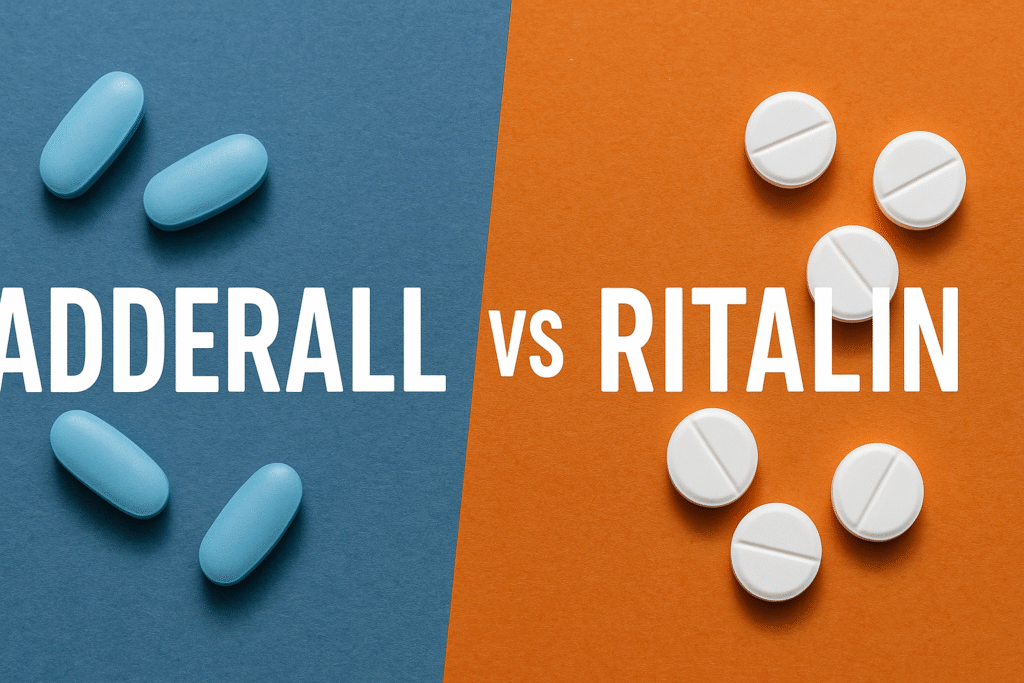Adderall vs Ritalin are both stimulant medications commonly prescribed to treat Attention Deficit Hyperactivity Disorder (ADHD). While they share similarities in their therapeutic effects, they differ in composition, onset and duration of action, side effects, and potential for misuse.

Composition & Mechanism of Action
- Adderall: A combination of amphetamine salts (75% dextroamphetamine and 25% levoamphetamine). It increases the levels of dopamine and norepinephrine by promoting their release into the synaptic cleft.
- Ritalin: Contains methylphenidate, which primarily acts as a norepinephrine-dopamine reuptake inhibitor (NDRI), blocking the reabsorption of these neurotransmitters to increase their availability.
Onset & Duration
- Ritalin: Typically has a quicker onset, reaching peak levels within 1 hour. However, its effects are shorter-lived, lasting about 2–4 hours for immediate-release formulations.
- Adderall: Takes longer to reach peak concentration (approximately 3 hours) but has a longer duration of action, lasting about 4–6 hours for immediate-release and up to 12 hours for extended-release versions.
Dosage & Potency
- Potency: Adderall is generally more potent; a 5 mg dose of Adderall is roughly equivalent to 10 mg of Ritalin.
- Dosage Forms:
- Adderall: Available in various strengths ranging from 5 mg to 30 mg.
- Ritalin: Typically available in 5 mg, 10 mg, and 20 mg tablets.
Side Effects & Risks
Both medications share common side effects, including:
- Insomnia
- Loss of appetite
- Increased heart rate
- Dry mouth
- Anxiety
However, due to its amphetamine content, Adderall may have a higher risk of certain side effects, such as:
- Elevated blood pressure
- Potential for cardiovascular issues
- Higher potential for misuse and dependency
Long-term use of stimulant medications, especially without medical supervision, can lead to serious health concerns, including cardiovascular problems.
Efficacy & Individual Response
Both Adderall vs Ritalin are both stimulant medications commonly prescribed to treat Attention Deficit Hyperactivity Disorder (ADHD) are effective in managing ADHD symptoms, but individual responses can vary:
- Some individuals may respond better to one medication over the other.
- Factors influencing effectiveness include individual metabolism, presence of co-existing conditions, and potential side effects.
- It’s essential to work closely with a adderallnorx.us to determine the most suitable medication and dosage.
Summary Comparison
| Feature | Adderall | Ritalin | |
|---|---|---|---|
| Active Ingredient | Amphetamine salts | Methylphenidate | |
| Onset of Action | Slower (peaks ~3 hours) | Faster (peaks ~1 hour) | |
| Duration | Longer (4–6 hrs IR; up to 12 hrs XR) | Shorter (2–4 hrs IR; up to 8 hrs XR) | |
| Potency | Higher (5 mg ≈ 10 mg Ritalin) | Lower | |
| Common Side Effects | Insomnia, appetite loss, anxiety, elevated heart rate | Similar side effects | |
| Risk of Misuse | Higher due to amphetamine content | Lower |
Final Thoughts
Choosing between Adderall vs Ritalin depends on various factors, including how quickly symptom relief is needed, how long the effects should last, individual side effect profiles, and personal response to the medication. It’s crucial to consult with a healthcare professional to determine the most appropriate treatment plan tailored to individual needs.
Leave a Reply